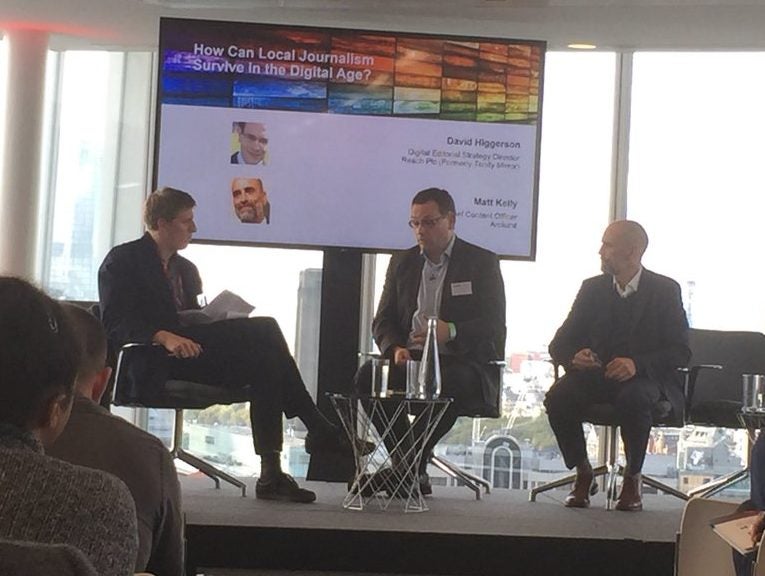
Getting people to pay for local journalism online is now “nigh-on impossible”, Archant’s chief content officer Matt Kelly has said.
Kelly said what is being offered is “not good enough, frankly”, but said he is not in favour of paywalls or subscriptions for local news websites.
David Higgerson, digital editorial strategy director at Reach (formerly Trinity Mirror), said he believes the business model for local journalism is not broken “in the long-term”.
Kelly agreed, saying: “I don’t think it’s broken, I just think it’s misunderstood. I think regional media have misunderstood the business model behind what it does for a long time.
“… I think it’s a fact that regional media has a self-esteem issue when it comes to new technology. We assume the big national publishers know what they are doing and we follow them.”
Kelly added that local newspapers should be “the single most lucrative media space” in local communities, especially as closures have led to them often having a monopoly.
“Why aren’t we thriving in those communities?” he asked, saying regional publishers have not focused enough on engaging with their readers.
Kelly gave the example of the North Norfolk News where he said to the team “I want to be bigger than Facebook in Cromer”.
After paying more attention to what the community wants, Kelly said the title is now engaging more people in Cromer than Facebook, although people are still visiting the social media giant more frequently.
Higgerson said he does not see Facebook as a threat to news publishers in their quest to engage communities – although “definitely on the commercial side”, adding he agrees the tech giant should pay publishers for the value their content adds to people when they are on the site.
“But in terms of audience attention the bigger threat is of us not taking Facebook seriously and insisting to ourselves we know what the news is, we will publish the news as we see fit and you will consume it.”
Kelly said publishers need to do better at making their websites compelling places to visit in their own right without readers coming from Facebook first.
“You need to have control of your own platform,” he said. “You need to have absolute access to the data and audience insights so you can really start to drive that level of engagement.
“You need to make your platform a really compelling place for people to come, not just once a month but three times a day. Why don’t people come three times a day?”
Kelly said publishers must ask “what are we getting wrong?”
“It isn’t the audiences’ fault, it isn’t Facebook’s fault. We’re not doing the right thing. We’re not building the right type of platform to make people think ‘I’ll go to the Eastern Daily Press’.”
He added that the more local newspapers look at themselves as specialist media for the areas they cover, rather than a subset of national news, the more they will engage with their communities.
Higgerson said publishers are “not putting as much effort as we should be in explaining the importance of our journalism to our readers” and that it is crucial to build relationships in order to bypass platforms like Facebook.
He said the Manchester Evening News has seen a “spike in audience” and a “huge surge in local readers” since the terror attack at the Manchester Arena concert venue in March 2017 where 22 people were killed.
Higgerson added: “The MEN was already doing very well in terms of its audience, but [people] started returning because they realised there was something very special there and they stuck with it and the MEN is doing what it always has done but a lot more beyond that.”
This year Reach has announced plans to cut almost 100 staff across its regional titles.
Higgerson said: “None of us woke up at the start of the year and thought ‘it will be a really successful year if we take a couple of dozen jobs out’.”
He added that staff cuts are the last resort, with office closures the preferred method to save money where needed.
“If you started looking at some of the pop-up operations or hyperlocal news operations celebrated for stepping in where apparently we aren’t, which is a narrative I don’t think always stacks up, they don’t always have offices.”
Higgerson added: “While any title that’s lost is sad for anyone who’s a journalist, many of those that were counted as individual titles were often freesheets,” which he said usually feature less original journalism.
“That isn’t a defence for the job losses, but also accepting the reality that it could have been far worse,” he said, referencing Enders analysis from a decade ago that said the local journalism industry wouldn’t survive.
Kelly said there are benefits to having reporters based outside an office, saying his “pet hate” is when they think it’s an office job and don’t go out.
“My view is if we have to close the office, I don’t care if they have to work from Starbucks on free wifi as long as they are in the community.”
Press Gazette’s Digital Journalism Summit is held in association with News UK.
Email pged@pressgazette.co.uk to point out mistakes, provide story tips or send in a letter for publication on our "Letters Page" blog
